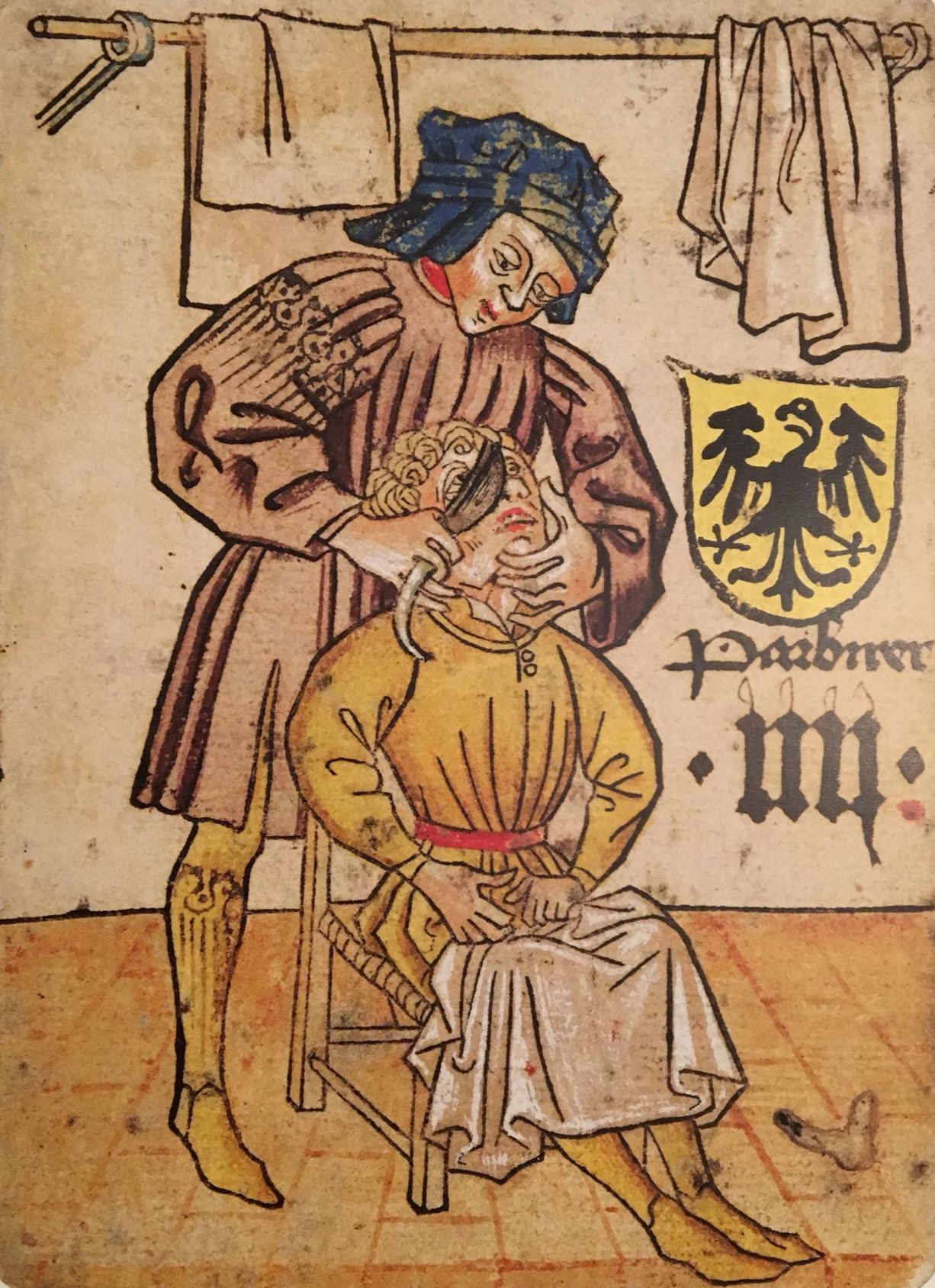Joke 114: About the prostitute who complained about the barber’s evil deed | Facetia CXIV: De Meretrice Conquerente De Tonsoris Maleficio

Barber from The Courtly Household Cards. Kunsthistorisches Museum Wien, Kunstkammer (KK 5088) [Public Domain]
Read the text (PDF)
Introduction to the Text
Gian Francesco Poggio Bracciolini (commonly referred to as simply Poggio Bracciolini) was born in Terranuova (Tuscany) in 1380. He died in Florence in 1459 at the age of seventy-nine. During his long life this early and important humanist had an equally long career at the Papal curia. In the service of a sequence of popes he lived in Rome, travelled with the papal court all across Italy and the rest of Europe.
Poggio produced a wide range of writing during his career (his collected works span four substantial volumes). He often worked in the dialogue form or wrote speeches, but he also wrote history. He was an avid book hunter and a skilled scribe.
Through his texts we also meet a very polemical man, who seems to get into fights with many of his contemporaries, the most famous of which is his conflict with another of the humanist greats, Lorenzo Valla. The collections of jokes and stories known today as the Facetiae, but which Poggio himself preferred to refer to as Conversations ( Confabulationes), certainly contains a polemical edge. While Poggio’s invectives are violently polemical and often personal, his Facetiae are more mildly polemical in the satirical tradition. The Facetiae as it is preserved consists of 273 jokes/stories ranging from just a few lines to a page in length. The collection also has an introduction and a type of conclusion. The short selection presented here contains a few rowdy jokes that poke fun at crude people and priests or monks, and another few stories with witty remarks from historical or contemporary characters. For readers interested in the obscene elements in the Facetiae, Poggio’s work can be compared to Beccadelli’s The Hermaphrodite, which offers another contemporary source of obscenity, but one based on very clear ancient models (among others Catullus). The selection shows that Poggio seems to have put his main focus on witticism when writing the stories; whether rude tales or short adventures of cooks, soldiers or even the famous Dante, the punchline seems almost always to be some sort of turn of phrase or wry observation (although this might not always be completely obvious to a modern reader).
This joke combines a rude story with a contemporary legal practice.
Introduction to the Source
The Facetiae seems to have had immediate success. The collection as we now know it was composed between 1452-53, but Poggio had by then been working on versions of it (some of which had been in circulation) from as early as 1438. Over fifty manuscripts containing the text are preserved to this day. The Facetiae was also printed early and repeatedly, first appearing in this form around 1470. Another testimony to the popularity of the text is the fact that Poggio’s jokes or ‘conversations’ were translated to several other languages, either the entire collection (to Italian and French at the end of the fifteenth century) or individual stories, which were mixed into the different Aesop collections circulating during this period. Herein lies somewhat of an irony, since Poggio himself in the introduction to the Facetiae seems to indicate that the object of writing them is to write stories in Latin that are usually told in the vernacular languages.
About this Edition
The translation is based on the text as it appears in the Basel 1538 edition of Poggio’s collected work available on Google Books, with a slight update to punctuation and orthography (for instance, ij is represented as ii). No emendations or other corrections have been made by the translator. Older versions of the text contain a few variants and some obvious errors, but in general the tradition seems quite stable (see, for example, an early print from 1471; or the fifteenth-century manuscript in Paris, Bibliothèque nationale de France, Latin 8770A).
Further Reading
Kallendorf, Craig. “Poggio Bracciolini” in Oxford Bibliographies. DOI: 10.1093/OBO/9780195399301-0095.
- Craig Kallendorf’s article in Oxford Bibliographies is a good starting point for researching Poggio. The article contains information about relevant editions, translations, and research.
Pittaluga, Stefano, ed. Facéties = Confabulationes: Édition bilingue. Translated by Etienne Wolff. Bibliothèque italienne. Paris: Les Belles Lettres, 2005.
- The most recent critical edition of the Facetiae.
Beccadelli, Antonio. The Hermaphrodite. Edited and translated by Holt Parke, I Tatti Renaissance Library 42, Cambridge, MA: Harvard University Press, 2010.
- Another example of obscene elements in Renaissance Latin (also contains letters exchanged between Beccadelli and ` Bracciolini).
Gordon, Phyllis W. G., ed. Two Renaissance Book Hunters: The Letters of Poggius Bracciolini to Nicolaus de Niccolis. New York: Columbia University Press, 1974.
- This letter exchange shows the scholarly side of Poggio.
Bracciolini, Poggio. The Facetiae of Giovanni Francesco Poggio Bracciolini. Translated by Bernhardt J. Hurwood. New York: Award Books, 1968.
- This is apparently an earlier translation of the Facetiae (I was not, however, able to consult this book for the present translation).
Joke 114: About the prostitute who complained about the barber’s evil deed | Facetia CXIV: De Meretrice Conquerente De Tonsoris Maleficio
Facetia CXIV
Magistratus est Florentiae, quem Officiales honestatis vocant: horum praecipua cura est in iure meretricibus dicendo, curandoque ut in omni civitate absque molestia esse possint.
Accessit ad eos semel meretrix, questa iniuriam damnumque a tonsore illatum, qui in balneum accersitus ab ea ut partes inferiores raderet, rasorio ita cunni partem incidit, ut pluribus diebus homines admittere nequivisset, ex quo damni infecti illum accusabat, amissi lucri restitutionem petens.
Quaeritur quae sit futura sententia?
Joke 114
In Florence there is a magistracy called the Office of Respectability, whose main responsibility it is to preside over legal matters pertaining to prostitutes and to make sure that they can work untroubled all through the city.
Once a prostitute came to this office and complained that she had suffered injury and damage from a barber. He had been summoned to the baths to shave her nether parts, but he had cut a part of the pussy with the razor so bad that she could not receive men for several days. For this she accused him of anticipated damage and asked to be repaid the lost income.
One wonders what the judgment might be?
